A night-shift handover marked the end of an era for the Trust Tairāwhiti Eastland Rescue Helicopter critical care flight paramedic team.
After working for a year in Gisborne, ex-pat Englishman Thomas Grantham had decided for family reasons to relocate to Australia and was on his last shift.
And long-termer Lachlan Clark had just announced that, again for whanau reasons, he and his family were moving to Waikato where he would rejoin the service’s operating company, Search and Rescue Services Ltd (SRSL).
“Both had good reasons for moving on and it was just a coincidence that their family circumstances changed in the same period,” says base manager (and fellow critical care flight paramedic) Richard Curtis.
“But it certainly was a blow to learn we’d be losing all that experience and all that commitment from what is a very tight and high-functioning team.”
Thomas Grantham came to Gisborne with more than 20 years experience in paramedicine under his belt, first with land-based ambulance services and later with aeromedical services around the world.
Once on-roster he was quickly embedded in rural and remote communities around the region.
“While we were certainly dealing with serious medical issues the thing that stands out most for me is how closely the team works with those communities, and how much they are valued,” he says.
“I got a crash course in working with a diverse group of patients and in the importance of Maori culture, which was an incredible learning curve.
“That was supported by the fantastic St John ambulance crews, particularly on the East Coast. We all had a wonderful working relationship right from the start.”
Though relocating was the right decision for his family, he says it was tough to leave his new “whanau” at the Eastland Helicopter Rescue Trust’s Gisborne hangar.
“The team has been so supportive and welcoming,” he says. “And in terms of a job environment, this base was one of the happiest I’d worked at in my whole career.”
Meanwhile, Lachlan Clark is a relative veteran with the Eastland Rescue Helicopter having joined in 2020 to take the number of team members to six, half what it is today.
Though he’d already worked for seven years with Hato Hone St John land ambulances he was still aged just 27, at the time the youngest CCFP employed by SRSL.
“It was when the growth in the service had really just started, having the BK (helicopter) was quite new and we were on 96-hour rosters, which were pretty challenging,” he says. “But there was a lot of experience on board so we were quite a well-oiled team.”
Originally from Australia, Lachlan was a toddler when his family moved to Thames where he grew up on his grandparents’ farm and, as he got older, enjoyed a childhood packed with outdoor pursuits and sport.
As a rep player for Thames Valley he’d planned a career in rugby but had to rethink after an injury – a ruptured ACL (anterior cruciate ligament) – forced him off the field.
So he headed to Auckland to study for a Bachelor in Health Science, majoring in sport and exercise science.
“At the time some of my friends were studying paramedicine which looked a lot more interesting, and with better career prospects,” he says.
“Switching my major and following up with post-graduate study in critical care paramedicine turned out to be 100 percent the right decision as it took me into a career I absolutely love.”
Having the skills and knowledge to help people is deeply rewarding, whatever their level of need, he says.
“The work the team does is important regardless of the acuity . . . you are providing equity of healthcare to people who may not otherwise have access.
“The biggest difference in aviation medicine is the complexity of how you manage your patient . . . our preference is to treat and stabilise before heading off to the targeted destination.
“But there’s also a role to play in the flying part, like rescues, winching and searches. That always keeps things interesting!”
Working and living in Gisborne was a great experience for Lachlan, his wife and their now four-year-old daughter.
“When we first came here we didn’t know anyone so the Eastland Helicopter Rescue Trust helped us do things like find our first home and connect with childcare before we were able to establish our own networks.
“But the move was for my career and now it’s my wife’s turn to focus on hers, which is why we are relocating.”
Despite the move, Richard Curtis says the Eastland Rescue Helicopter service may not have seen the last of Lachlan Clark.
“While SRSL is recruiting for replacements it is sending us cover to support myself and critical care flight paramedic Gareth McDougall, and Lachy may well end up on that roster.
“But we’re going to miss him. His contribution to his work, to the community and to the development of the base is a huge loss to the team.”
CAPTION: SIGNING OUT: Trust Tairāwhiti Eastland Rescue Helicopter critical care flight paramedics Lachlan Clark (left) and Thomas Grantham at their last shift handover before both relocated for family reasons.
